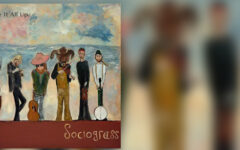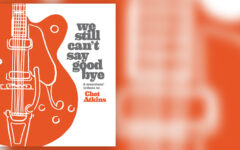
Many bluegrass albums are touted as solo records, particularly when an artist who is best known as part of a popular band steps out on their own. However, As Time Goes By, the newest album from Jacob Underwood, banjo player for Illinois-based band Bluegrass Express, is a solo record in the strictest definition of the word. With the exception of guest harmony vocalists on two songs, Underwood is the only musician on the entire album – singing lead and harmony, and playing guitar, banjo, fiddle, mandolin, and bass. Pretty impressive! Also impressive is the music he tackles here – popular music from the 1930s, ’40s, and ’50s, all rendered in a strong, straightforward bluegrass style.
According to the album’s liner notes, although Underwood grew up steeped in traditional bluegrass and playing in a family band, his grandpa introduced him to classic music from the likes of Perry Como several years ago. His goal for this album, then, became to transfer the songs he liked from that era to bluegrass versions, while still maintaining a bit of the sound from the originals. The result is an intriguing concept, filled with songs that will be new to many listeners, rendered in a smooth, enjoyable style.
The album opens with Pretend, most famously recorded by Nat King Cole in 1953. Underwood has captured the feeling and melody of the original, while speeding up the tempo just a bit and replacing strings and horns with bright mandolin and fiddle. The song seems hopeful at the surface, with the singer urging listeners to pretend they’re happy even when they’re not, but Underwood also captures an undercurrent of wistfulness in the lyrics. Another strong cut is Perry Como’s Moonlight Love, which I would have never guessed was a 1950s pop song. Here, it’s an upbeat, banjo and fiddle-guided love song that could easily fit in on any number of modern traditional bluegrass albums. Underwood’s harmonies on this cut are also particularly strong.
Till I Waltz Again with You, originally recorded by Teresa Brewer in the early 1950s, is given a country shuffle makeover by Underwood, with fine fiddle, banjo, and bass work. Underwood shows off a good control of his vocals on this song, making it a highlight of the album. It still has a strong ’50s vibe, but more of a dance hall/honky tonk sound than the smooth, jazzy pop of the original. Another of the best makeovers on the album has to be Only Forever, which takes the slow, crooner style of Bing Crosby and turns it into Lonesome River Band, circa the early 1990s. Again, I’d have never guessed the origins of the song if I hadn’t looked it up. I’d love to hear this one on the radio.
A few songs on the album lean more toward their source material than the others do, such as jazz standard All of Me. Although the song has been recorded by a number of popular singers over the years, including Ruth Etting and Billie Holliday, Underwood leans into the crooner vocal style he obviously admires, taking a note from Frank Sinatra’s recording of the song. As Time Goes By also has a lot of that same style, both in the vocals and instrumentation. Classic movie fans may recognize it from its appearance in Casablanca. Underwood is joined by Norwegian singers Anniken Ottersen Lindbak and Rebekka Fjellstad Fredsrud with excellent harmony vocals.
This album really surprised me, because I was honestly expecting less bluegrass and more 1940s pop. However, although Underwood captures the vocal style of that time period on several songs, and often utilizes fiddles to mimic the sweeping strings on the original cuts of these songs, this is a bluegrass album through and through, and a thoroughly enjoyable one at that. Underwood is definitely to be commended for his skill with both arranging and performing here.
For more information on Jacob Underwood, or to order As Time Goes By, visit him online.







